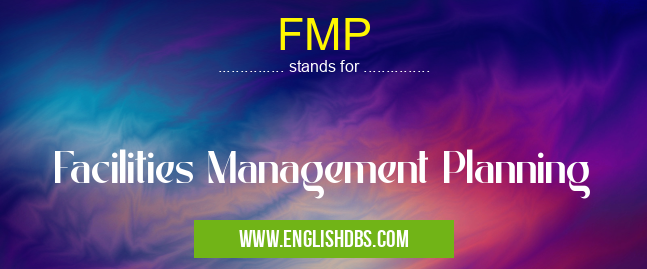What does FMP mean in MANAGEMENT
FMP (Facilities Management Planning) is a comprehensive process that involves planning, organizing, coordinating, and controlling all aspects of facilities management to achieve specific objectives. It provides a framework for managing and maintaining facilities to ensure their efficient and effective operation, safety, and compliance with regulatory requirements.

FMP meaning in Management in Business
FMP mostly used in an acronym Management in Category Business that means Facilities Management Planning
Shorthand: FMP,
Full Form: Facilities Management Planning
For more information of "Facilities Management Planning", see the section below.
» Business » Management
FMP Meaning in BUSINESS
FMP plays a crucial role in businesses by optimizing the performance of facilities and ensuring their alignment with overall business goals. It helps organizations:
- Reduce Operating Costs: By optimizing energy consumption, space utilization, and maintenance schedules, FMP can significantly reduce operating expenses.
- Improve Productivity: A well-maintained and comfortable work environment can enhance employee productivity and well-being.
- Ensure Regulatory Compliance: FMP ensures that facilities meet all applicable safety, environmental, and building codes, minimizing legal risks and fines.
- Enhance Asset Value: Regular maintenance and preventive measures help extend the lifespan of facilities, preserving their value and reducing the need for costly replacements.
- Support Sustainability: FMP promotes sustainable practices by incorporating energy-efficient technologies, reducing waste, and optimizing resource utilization.
Essential Questions and Answers on Facilities Management Planning in "BUSINESS»MANAGEMENT"
What is Facilities Management Planning (FMP)?
FMP is the process of developing a comprehensive plan to manage and maintain a facility in a cost-effective and efficient manner. It involves assessing the current state of the facility, identifying areas for improvement, and developing strategies to meet the organization's needs.
What are the key components of an FMP?
An FMP typically includes:
- An assessment of the facility's current condition and needs
- A detailed plan for maintenance and repair activities
- Strategies for enhancing energy efficiency and reducing costs
- A plan for managing waste and environmental compliance
- A budget for implementing the plan
What are the benefits of FMP?
FMP provides numerous benefits, including:
- Reduced operating costs through improved maintenance and energy efficiency
- Increased productivity and efficiency of facility operations
- Enhanced safety and security of the facility
- Improved aesthetics and comfort for occupants
- Increased asset value and lifespan
Who is responsible for developing and implementing an FMP?
The responsibility for developing and implementing an FMP typically falls upon the facilities manager or a designated team. This team should have expertise in facility management, maintenance, and planning.
How often should an FMP be reviewed and updated?
An FMP should be reviewed and updated regularly to ensure it remains aligned with the organization's needs and industry best practices. The frequency of review will vary depending on the size and complexity of the facility, but it is generally recommended to review the plan at least annually.
Final Words: FMP is an essential aspect of facilities management that enables businesses to effectively manage and maintain their facilities, ensuring optimal performance, cost-efficiency, and regulatory compliance. By implementing a comprehensive FMP, organizations can maximize the value of their facilities and support their overall business objectives.
FMP also stands for: |
|
| All stands for FMP |
